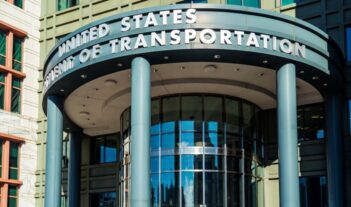
Scholars address possible strategies to regulate an emerging commercial space industry.
After much anticipation, the United States launched a manned rocket ship for the first time in almost a decade. The launch marked a new era of space travel as Elon Musk’s SpaceX became the first private company to transport astronauts to space.
But the transformation of spaceflight from a public endeavor to a commercial industry raises questions about how to regulate the activities of private entities in space.
In 2014, the National Aeronautics and Space Administration (NASA) outsourced the task of transporting its astronauts, granting billion-dollar contracts to SpaceX and Boeing in a program called Commercial Crew. NASA astronauts Doug Hurley and Bob Behnken became the first crew to enter space under this public-private program. Over the next few decades, NASA plans to rely on this commercial partnership to pursue even more ambitious goals: returning to the moon and sending astronauts to Mars.
But private companies have their own aspirations for outer space. Musk hopes to use SpaceX to start a human colony on Mars. Amazon’s Jeff Bezos also has his sights set on space colonization, and firms such as Bigelow Aerospace and Axiom Space plan to develop their own space stations. Some investors see opportunities in space tourism and mining. But these for-profit goals raise serious concerns about who can claim ownership of space resources and what law will govern private activity in uncharted frontiers.
International space law is governed by a 1967 agreement known as the Outer Space Treaty. The treaty allows all nations to use and explore the moon and celestial bodies, prohibits claims of sovereignty, and it requires nations to oversee the activities of private space companies.
But existing space law has not kept up with the growth in the private sector, and the United States lacks a comprehensive regulatory regime. In anticipation of a growing commercial space industry, some experts and scholars call for more robust regulation. This week’s Saturday Seminar focuses on possible legal frameworks for governing commercial activity in outer space.
- In a working paper for the Mercatus Center, Laura Montgomery argues that the Federal Aviation Administration (FAA) and other federal agencies overreach their authority when they rely on Article VI of the Outer Space Treaty to deny private actors access to space. Montgomery contends that because Article VI is not self-executing, under existing U.S. Supreme Court precedent, it is not enforceable federal law. She argues that federal regulatory agencies cannot prohibit or regulate private space activities on the basis of enforcing the treaty. Montgomery similarly finds that Congress did not delegate authority to the FAA to deny private actors’ access to space. Instead, the legislative branch determines which activities by private actors “require Article VI authorization and supervision.”
- In a recent Air Force Law Review article responding to Laura Montgomery’s argument that Article VI of the Outer Space Treaty is unenforceable, the U.S. Department of Defense’s John S. Goehring claims that the United States has a direct responsibility to regulate such activity. Signatories to Article VI of the Outer Space Treaty—including the United States—have an affirmative obligation to authorize and continually supervise both governmental and non-governmental space activities, according to Goehring. Although he agrees with Montgomery that this obligation should not lead to the United States regulating “a musician playing the harp on the moon,” Goehring asserts that “activities such as launch, re-entry, operation and control of objects in orbit” should fall under governmental oversight. Adopting a regulatory view that ignores this obligation could have longstanding national security repercussions, he claims. Congress should encourage responsible behavior in space for the sake of U.S. national security, Goehring argues, rather than undermining Article VI.
- Daily space system operations often result in the presence of space debris, which can include anything from fallout left behind by satellite explosions and collisions to human generated waste from previous space missions. As commercial space traffic increases, the U.S. regulatory system must adapt and build a strong foundation for future debris mitigation, Marlon Sorge of the Aerospace Corporation argues. In a recent paper with the Center for Space Policy and Strategy, Sorge asserts that the federal government should re-evaluate its existing regulatory structure to maximize the potential benefits of commercial space activity and focus on debris mitigation. Through his proposed “one-stop-shop” model, Sorge explains that centralizing regulatory functions under one body could enable more efficient coordination between agencies as they tackle the rapid emergence of the commercial space sector.
- In a recent article in the Journal of Air Law and Commerce, Andrea J. Harrington of the U.S. Air Force Air Command and Staff College argues that there are not enough protections for space-related objects and sites under current international and cultural heritage law. Currently, there are no treaties that directly address the treatment and protection of space-related cultural heritage. U.S. government entities and nonprofits have proposed national protections for the Apollo landing sites, such as NASA’s Recommendations to Space-Faring Entities. Harrington claims that, although important, these recommendations are just “baby steps” since they do not apply to foreign actors. To preserve existing and future space-related cultural heritage, Harrington calls for a multistep process that would culminate in binding bilateral and multilateral treaties, which could eventually lead to the development of broad protections in customary international law.
- Without strong governing principles, “outer space could turn into the ‘Wild West’ of the twenty-first century,” Georgetown University Law Center’s Hope Babcock writes in an article published in the Syracuse Law Review. Because people will inevitably capitalize on celestial resources, there ought to be consensus on which property regime should apply, she asserts. Finding that pure private property regimes would encourage competitive behavior that would exacerbate hostilities and inequalities between nations, Babcock argues instead for a modified version of the public trust doctrine. Such a regime would incorporate some private property management tools, allowing for sustainable and equitable extraterrestrial development, according to Babcock.
- In an article published in the University of Pennsylvania Journal of International Law, Nebraska College of Law’s Matthew Schaefer asserts that there is currently a regulatory gap for private space activities that is similar to a purely permissionless scheme. He argues that this gap “actually undermines the benefits of permissionless innovation.” He claims that a purely permissionless system is inconsistent with international obligations, threatens national security, and inhibits the growth of the private space sector. Shaefer instead proposes a light touch approach that would comply with international obligations, protect national security, and provide greater certainty for investors while also maximizing “permissionless innovation thinking.” Schaefer lists eight features—such as “creating a default presumption in favor of approval”—that he argues should be included in any new regulatory space regime.
- In an article published in the Melbourne Journal of International Law, Western Sydney University’s Steven Freeland advocates clearer international regulations in anticipation of commercial space flight and tourism. He argues that regulations must address what types of space tourism activities should be allowed. For example, would the construction of casinos or brothels on the moon be acceptable? Freeland further asserts that international regulations are needed to protect “heritage sites” from damage and to preserve the environment of outer space, especially if space tourist vehicles could become a significant source of carbon emissions.
The Saturday Seminar is a weekly feature that aims to put into written form the kind of content that would be conveyed in a live seminar involving regulatory experts. Each week, The Regulatory Review publishes a brief overview of a selected regulatory topic and then distills recent research and scholarly writing on that topic.



